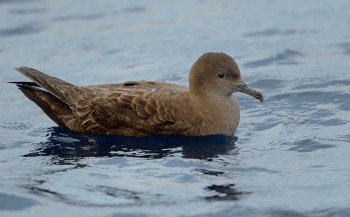Hannah Cousin and colleagues have written on ingestion of plastics by Short-tailed Shearwaters Puffinus tenuirostris, now in press with the journal Emu – Austral Ornithology.
The paper’s abstract follows:
“In recent years, there has been increased reporting of marine plastic debris ingestion in seabirds. Our aim was to assess the frequency and impacts of ingested plastic debris in pre-fledging chicks of the Short-tailed Shearwater (Puffinus tenuirostris) in Tasmania. We necropsied 171 chicks confiscated after illegal poaching to determine presence or absence of plastic debris in the proventriculus and ventriculus, and examined whether there was a correlation between body condition (as estimated based upon body mass and fat scores) and quantity of plastic ingested (by count and weight of items). We found 1032 plastic particles were ingested, comprised of both industrial (31%) and user plastic (69%). Most of the shearwaters (96%) contained plastic debris with an average of 148.1 mg (± s.e. 8.1 mg) per bird. Most plastic was found in the ventriculus. Light coloured plastic pieces dominated (63.76%), followed by medium and dark coloured (22.09% and 14.15%, respectively). We found that total ingested plastic mass was not significantly related to body condition, fat scores or mass. Our paper highlights the prevalence of plastic pollution in healthy shearwater chicks and underscores concern regarding the impacts of increasing marine pollution on a global scale.”

Short-tailed Shearwater at sea, photograph by Kirk Zufelt
Reference:
Cousin, H., Auman, H., Alderman, R. & Virtue, P. in press. The frequency of ingested plastic debris and impacts on body condition in Short-tailed Shearwater (Puffinus tenuirostris) pre-fledging chicks in Tasmania, Australia. Emu.
John Cooper, ACAP Information Officer, 27 November 2014

 English
English  Français
Français  Español
Español